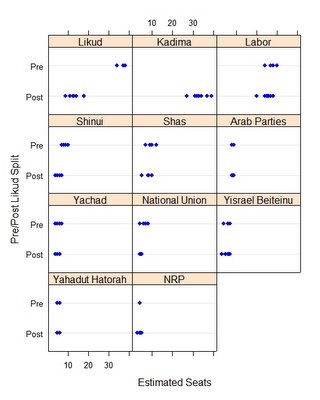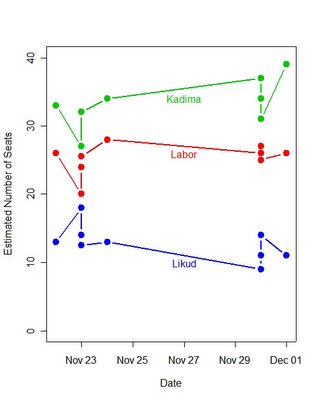
The early elections in Israel are providing an interesting example of party system change. Prime Minister Ariel Sharon's decision to quit the Likud party to form a new centrist party, Kadima, has not only split Likud, but also drawn some support from other parties as well.
Likud has been dramatically hurt by the split, falling in polls to support worth only 12.8 seats on average across polls. Likud currently holds 40 seats. Likud has also been continuing to decline in recent polls (see below). The reduction of Likud from the dominate party in Israel to a modest sized third or even fourth largest party is a remarkable shift. Even with nearly four months of campaign left, and allowing for short term support for the new party to subside, this still looks like one of the most remarkable collapses in modern party history.
Like a business worth more when broken up, Likud and Kadima are worth more seats than Likud alone was before the split. Prior to Sharon's decision, Likud was estimated to win 37 seats based on five polls taken shortly before the split. Since then Kadima and Likud together have averaged 46 seats combined. The increase in total support has come at the expense of the centrist Shinui party, which currently holds 15 seats in the Knesset. Since the Likud split, Shinui support has averaged only 5.3 seats in polls. Shinui averaged 8.6 seats in polls before the formation of the new Kadima party, suggesting that not all of the loss from 15 current seats was due to competition from Sharon's new party. Three other parties in the figure above show visible loss of support. Labor has seen poll support decline from 27.2 to 25.2 seats. Shas has lost one seat, from 9.6 to 8.6 seats. National Union (Ikhud) has dropped from 6.4 to 4.8 seats.

The campaign has a long while to run, but the first 10 days of polling has been kind to Kadima and harsh to Likud, with Labor holding steady or slightly gaining over the last 10 days. In the most recent round of polls, Kadima has support ranging from 31 to 39 seats. Labor is estimated to win 25-27 seats while Likud wins only 9-14 seats. For Likud this is a drop from the 13-18 seats they held a week earlier, immediately after Sharon left the party.
Likud's prospects are currently also clouded by the choice of a new party leader. Finance Minister Benjamin Netanyahu commands the most support in current polls of Likud members, but among the entire Israeli electorate, Likud polls worse under his leadership than that of one of his competitors, Defense Minister Shaul Mofaz. In a poll conducted by Shvakim Panorama for Israel Radio on November 30, Likud wins 11 seats with Netanyahu and 14 with Mofaz. Earlier polling found Likud won four more seats with Mofaz than with Netanyahu (18 vs 14, November 23, Maagar Mochot for Makor Rishon.) Likud will choose its new leader on December 19. Clearly that decision could affect the dynamics we have seen so far.
For those of us who study electoral and party systems, this is an exciting opportunity to observe a party system in change. For everyone, it is a powerful political story. Stay tuned. I'll update the polling on and off until the March 28 election.
Data: The data are taken from two primary sources, both of which are excellent. Angus Reid Consultants in Canada has a nice collection of polls from all over the world. Their summary of polls from Israel usually include helpful commentary as well. Independent Media Review Analysis in Israel does an excellent job of reporting current polling, usually the same day polls appear, or the next.
And one Note: Because the Israeli electoral system is extremely proportional and governing outcomes highly dependent on coalitions of Knesset parties, polls are routinely reported in terms of estimated seats won, rather than percentage of voter support. Raw percentage figures are in fact quite hard to come by. In particular, I am unaware of how undecided voters are handled in these calculations. That is a topic for another day.